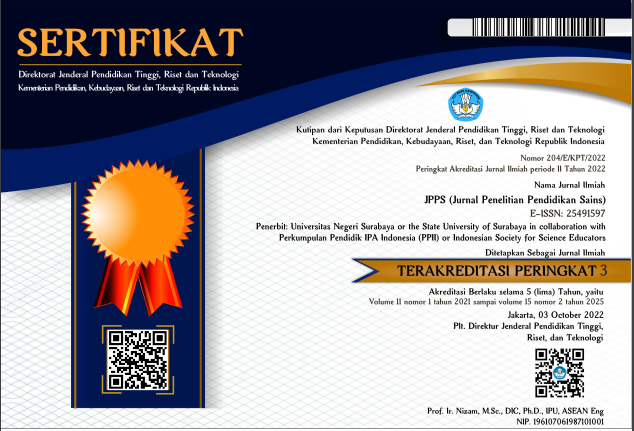THE 21ST CENTURY SKILLS ON CHEMISTRY LEARNING BASED ON VIRTUAL LAB IN SENIOR HIGH SCHOOL
DOI:
https://doi.org/10.26740/jpps.v11n1.p27-39Keywords:
The 21st century skills, high school chemistry learning, virtual labAbstract
Research aims to review 21st century skills in-based senior high school chemistry learning virtual labs. The components that will be studied include: (1) Barriers to high school chemistry learning; (2) 21st century skills; (3) The advantages and disadvantages of using virtual labs; and (4)implications of virtual labs on 21st century skills. The method used in writing the article is descriptive, qualitative by analyzing national and international articles related to 21st century skills in-based high school chemistry learning virtual labs. The results show that high school chemistry learning uses virtual The lab can integrate 21st century skills, visualize abstract concepts into concrete, support student-centered learning, reduce anxiety in facing real laboratories, and increase students' self-efficacy so that they can become a capable supporting unit for the chemistry learning process. However, in its implementation it needs to be adapted to content and activities that refer to various aspects of 21st century skills.
Downloads
References
Ekasari, R. R., Gunawan, G., & Sahidu, H. (2016). Pengaruh model pembelajaran langsung berbantuan media laboratorium terhadap kreativitas fisika siswa SMA. Jurnal Pendidikan Fisika dan Teknologi, 2(3), 106-110. http://dx.doi.org/10.29303/jpft.v2i3.296
Kolil, V. K., Muthupalani, S., & Achuthan, K. (2020). Virtual experimental platforms in chemistry laboratory education and its impact on experimental self-efficacy. International Journal of Educational Technology in Higher Education, 17(30). https://doi.org/10.1186/s41239-020-00204-3
Surbakti, D. A., & Supartono. (2016). Pengembangan karakter siswa pada pembelajaran kimia berbasis teknologi informasi menggunakan metode diskusi. Jurnal Inovasi Pendidikan Kimia, 10(2), 1807-1815.
Downloads
Published
How to Cite
Issue
Section
License
Copyright (c) 2021 JPPS (Jurnal Penelitian Pendidikan Sains)

This work is licensed under a Creative Commons Attribution-NonCommercial 4.0 International License.
 Abstract views: 1319
,
Abstract views: 1319
, PDF Downloads: 975
PDF Downloads: 975












